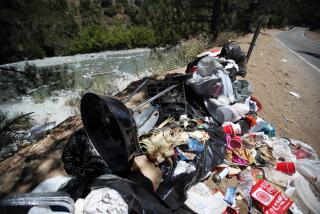All Hail the Worm King!
- Share via
Since the dawn of the modern age, there have been few great rulers who could say they controlled 10 billion worms and yet still didn’t have enough, but Hy Hunter of Granada Hills is one such man. Among his many pursuits, Hunter is the author of “The Whole Worm Catalog: The Billion Dollar Wiggle.” He lives in a giant hilltop estate--compound is a better description--that he purchased 30 years ago, in part from earnings off the wiggle. With its purple glass ceilings, reflective koi ponds, geodesic dome and prominent posters of Hunter himself, the residence looks more like the kingdom hall of a heavy metal god than the home of a smallish man whose only claim to prosperity is his self-described “worm thumb.”
Blind and ailing, Hunter pads over the mansion’s worn-out carpet, surrounded by several perimeters. The first is a band of plaster statuary, which Hunter has collected on journeys around the world; the second is made up of large green boxes full of California Red Super worms busy turning compost into Hunter’s patented fertilizer, Wormilizer, and the final perimeter is the men and women who come to tour the worm beds and to listen to how they, too, can grow worms for profit and become part of Hunter’s expanding empire.
“At the moment, I don’t have enough worms,” Hunter says much in the manner of a bureaucrat managing a Red Cross international relief operation. “I just brought back 20 million red worms from Brazil--worms which I sold them two decades ago--but I’d like to have 100 billion worms. We need millions and millions of worms in Canada, and right now I need about 5 billion worms in Germany.”
Hunter has kept constant company with worms longer than a lot of people live. In 1931, in Lyndeborough, N.H., he began collecting worms, picking them off lawns at night. He was 6. “Someone showed me how to write ‘W-O-R-M-S’ on a boulder,” he says, “and from that time on my life was changed.” Near the boulder, he sold worms for 25 cents a dozen, and then, after he turned 12, he took his proceeds and went into buying and selling used cars and financing a restaurant for his parents to run. When he left home in 1942 and began his travels, he always carried a shoe box full of worms under his arm and an equation in his head that went, “Ten worms breeding in two years equals 10 million worms.”
Since his arrival on the West Coast in 1946, he has bred California Red Super worms and California Gold Super worms. He started breeding California Red Giant worms, which he called “wharf worms” because he would sell them to fishermen, and then went into the breeding of African Lion worms and Siberian Mammoth worms, the last of which are 3 feet long and that get Hunter to thinking about catching 100-pound fish. Hy Hunter might have slipped into retirement as just a well-thought-of distributor to the recreation industry had it not been for the passage of a bill named AB 939 in the California Legislature in 1989.
AB 939 states that California landfills must reduce their waste by half by the year 2000. Hunter has always thought the best way to eliminate waste is to feed it to worms--like sharks, they eat anything--but few people listened until now. The scientific name is vermiculture, a composting process of feeding leaf and lawn clippings to worms, which in turn break the green waste down into rich fertilizer. Hunter, whose Hy Hunter Industries is now owned by son Dean, has veered out of retirement. He is giving worm seminars. A giant waste company in Germany--SKP of Hamburg--is paying him to take its garbage and convert it into Wormilizer, the result of a million-dollar contract he landed three months ago. He’s talking to Nicaraguan farmers, who made a large purchase of worms recently for their return to organic agriculture. He is also talking to the Russians, the South Africans, the Brazilians and the Argentinians. “Black gold,” Hunter calls his Wormilizer, “a hundred-million-billion-dollar profit opportunity.” So he is listening daily to the dozens of potential investors who are shepherded through his house, future worm farmers who like the stability of a round, even figure like a hundred-million-billion dollars.
Hunter is getting on with what he sees as the most important business of all--the business of saving the world. “I believe the lowly earthworm is the salvation of mankind,” he says, “and I’ve dedicated my life to this. Our planet is a living organism: It heats itself, it cools itself, it rushes through space at 100 miles an hour, and it’s trying to shake us off like a flea from a dog because of what we’ve done to it. I’m running around yelling, ‘911! 911! Look to the earthworm!’ Sometimes, I feel like a prophet out in the desert.”
Talking, Hunter displays all the features of a man linked with prophecy --the metallic shock of white hair, the gentle eyes that have become milky blue pools from years of blindness, the Buddha crouch he falls into whenever speaking from his purple sofa. Ten years ago, Hunter says, he was in the back bedroom praying for worms when a bolt of lightning struck the house and blinded him. “I was praying, ‘Thank you, God, for everything you’ve given me in the hardship of this earthworm business that’s so tough,’ when a bolt came out of the sky and burnt out all of the phones and computers in the house. The next day there was an atomic cloud in my eye.”
“The doctors say it was diabetes,” Hunter will admit today, “but I believe it was God telling me to let the people of the earth know the value of earthworms. You can take all the organic refuse on earth, feed it to worms, turn it into fertilizer and double the world’s food supply overnight. That’s the salvation of mankind.”
But it’s hard teaching salvation. A recent worm seminar drew just one listener. Hunter cannot find enough backing--private or governmental--to fly to Chernobyl to introduce worms into the toxic soil, a pet cleanup project of his. So far, no national retail chain is interested in placing his Wormilizer on the home-improvement market. And BFI--the nation’s second-largest waste-hauling company, whose synergy and garden clippings Hunter dreams daily of attracting--has answered the worm king’s entreaties with a phone call and a letter threatening action if Hy Hunter Industries fails to stop associating itself with BFI in advertising.
“Basically,” says Robert Shaw, a vice president at BFI in Houston, “we’ve looked at Hy’s project, and I’ve got to tell you, we’re not interested. We don’t see any economic profit for companies on a large scale in vermiculture.” There is no evidence that any company is interested in buying worms, Wormilizer or salvation from Hy Hunter. Still, people from places like Lubbock, Texas, and Virginia City, Nev., show up mornings in the driveway with the worm equivalent of lottery fever blazing in their eyes, hoping for a window seat on the ground floor of the coming worm boom.
“These are billion-dollar waste companies we’re talking about,” Hunter says, as visitors come and go through the front door. He is in a pleasantly contentious mood, a mood he gets in when he realizes that worms are multiplying faster than dollars and the world’s grace. “They’re not interested in what I’m suggesting. Won’t cost them a penny. I’ve done everything I could but hit them over the head. Not interested.”
Still, like all prophets, Hunter keeps looking for signs that might avert the final days--in 1995, the Chicago Board of Trade began listing recyclable trash as a commodity. He searches out those who might help him, come to his aid: the Regenwurm in Germany, the Blue-Nose in England, the Giant Red worm of Russia and a 14-inch South African Lion worm (“A very hungry worm, an unbelievable worm”). Hunter knows of another company that is trying to get worms to eat TNT, an organic technology that could disarm abandoned munitions dumps, and he is still hopeful that his worms will eventually process the heavy metals in Chernobyl’s soils.
Once a year, to rejuvenate, Hunter lies naked in a large wooden box, and for one hour, lets a million live worms crawl over him. He calls this his worm bath. Ask him if he thinks about death and his eventual wormilization, and he will answer, “Oh, no, no--death doesn’t worry me. I just sort of meditate on being included in the salvation of mankind and the rescue of the earth. Every once in a while, though, a worm will crawl in my nose and I have to pull it out.”






